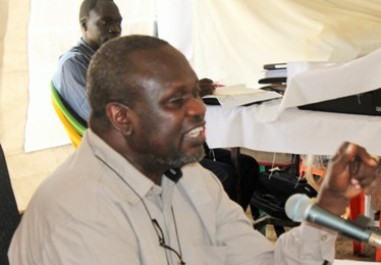Operationalizing 28 new states in South Sudan a waste of resources: SPLM-IO
March 18, 2016 (ADDIS ABABA) – The continued determination by the South Sudanese government under the leadership of President Salva Kiir to operationalize the controversial new 28 states in the country is a waste of resources and a misplaced priority as the economic crisis deteriorates, an official of the armed opposition faction of the Sudan People’s Liberation Movement (SPLM-IO) has said.

“The leadership of the SPLM/SPLA (IO) expects suspension of these 28 states in the event of forming a Transitional Government of National Unity,” he added.
He wondered what the government will have achieved by continuing with the implementation of the new states when it knows that they will be suspended in a matter of weeks and the parties may afterwards revert to 10 states as provided for in the peace agreement.
Dak was responding to media queries on the position and current view of the opposition faction on the new states as the government has continued to operationalize them despite the recent call from the East African regional bloc, IGAD, to suspend them, which the rival parties also agreed to.
An inclusive boundary commission with membership of all the parties to the peace deal will be established by the transitional government to try to reach a consensus on a number of new states to be created, including identifying and agreeing upon their boundaries.
The February 2016 IGAD communiqué, released in Addis Ababa by the bloc’s foreign ministers, also called on the parties to revert to the existing constitutionally recognized 10 states – which became the basis for the peace agreement – should there be no consensus on the number of new states and their boundaries.
But the government has continued to operationalize the 28 states it unilaterally created on 2 October 2015, arguing that it was a demand of the people of South Sudan.
The opposition official said his they expected the government to rather suspend the new states until when the parties sit and try to reach a consensus within one month from formation of the government and the boundary commission as stipulated in the IGAD communiqué.
Dak also said it did not make sense for the government to operationalize the “28 new problematic states” so as to accommodate more politicians at the expense of the people when it is not paying salaries to its army and civil servants as well as cutting down the number of its foreign mission officials abroad due to lack of funding.
Tens of thousands of people from such states, he alleged, have been fleeing from South Sudan to neighboring countries because of hunger while millions others are starving internally.
He further argued that some of the new states are problematic and will likely bring to the people of South Sudan more inter-communal violent conflicts.
The opposition’s official pointed out that some of the communities, such as the Shilluk ethnic group in Upper Nile region, whose lands have been grabbed and annexed to a Dinka neighbouring community in the process of creating the 28 states, have threatened to wage war in defence of their ancestral lands.
A better decision, he added, is to suspend the new states as called for by the IGAD communiqué and for the parties to collectively agree on the way forward.
(ST)
